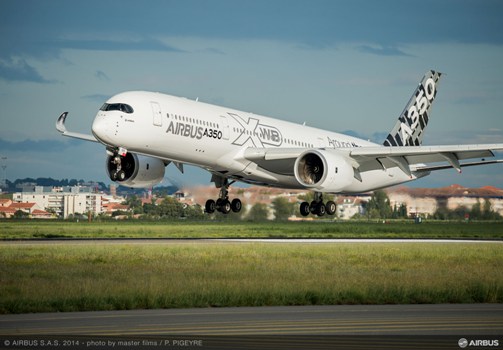To produce 3D printed flight parts for its A350 XWB aircraft.
 Airbus has produced more than 1000 flight parts on its Stratasys FDM 3D Production Systems for use in the first-of-type A350 XWB aircraft
Airbus has produced more than 1000 flight parts on its Stratasys FDM 3D Production Systems for use in the first-of-type A350 XWB aircraft
Stratasys Ltd., a leading global provider of 3D printing and additive manufacturing solutions, has announced that aircraft manufacturer Airbus has produced more than 1000 flight parts on its Stratasys FDM 3D Production Systems for use in the first-of-type A350 XWB aircraft, delivered in December 2014. The company said that the 3D printed parts were used in place of traditionally manufactured parts, the purpose of which was to increase supply chain flexibility and ensure it met its delivery commitment on-time. Airbus initiated development and certification of 3D printing with Stratasys in 2013 as a schedule risk reduction activity that proved valuable for the A350 XWB program, highlighting a key benefit of 3D printing in the manufacturing industry.
The parts are 3D printed using ULTEMTM 9085 resin for FDM, which is certified to an Airbus material specification. ULTEM 9085 resin provides high strength-to-weight ratio and is FST (flame, smoke, and toxicity) compliant for aircraft interior applications. This production method enables Airbus to manufacture strong, lighter weight parts while substantially reducing production time and manufacturing costs.
"We are delighted that Stratasys additive manufacturing solutions are being adopted by Airbus for its flagship A350 XWB aircraft. Both companies share a vision of applying innovative technologies to design and manufacturing to create game-changing benefits," said Dan Yalon, Executive Vice President, Business Development, Marketing & Vertical Solutions for Stratasys. "Our additive manufacturing solutions can produce complex parts on-demand, ensuring on time delivery while streamlining supply chains. Additive manufacturing also greatly improves the buy-to-fly ratio as significantly less material is wasted than with conventional manufacturing methods. Stratasys is looking forward to bringing these and other advantages to its collaboration with Airbus and to being part of Airbus' Factory of the Future initiative."
Stratasys also confirmed that leading companies in a variety of industries, from aerospace and automotive to consumer goods and medical, are partnering with it to adopt additive manufacturing strategies. A transformative alternative to conventional manufacturing methods, Stratasys additive manufacturing has been shown to enable original and replacement parts to be digitally produced at the best suited locations, reducing both material waste and inventory requirements. By adopting additive manufacturing throughout the product lifecycle, companies can therefore lower operational costs, accelerate time to market, decentralize production, and add new innovative product functionality.
You can Tweet, Like us on Facebook, Share, Google+, Pinit, print and email from the top of this article.
Copyright © 2015, DPNLIVE – All Rights Reserved.




















































